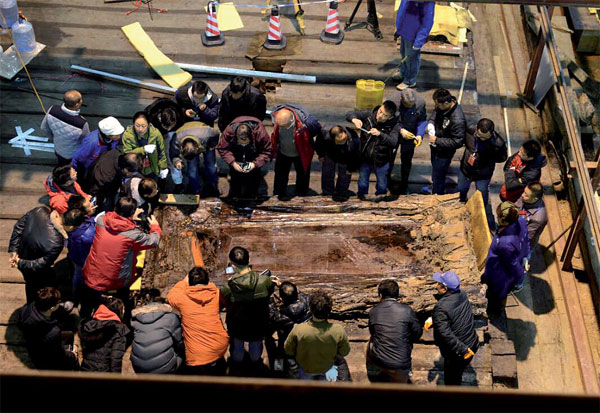 |
|
Experts and archaeologists examine condition of a 2,000-year-old tomb in Jiangxi province of a deposed emperor of the Western Han Dynasty (206 BC-AD 24). Guo Jing / For China Daily |
A gang of grave robbers were recently convicted at Chaoyang Intermediate People's Court in Northeast China's Liaoning province. Five members of the gang got life imprisonment while another 25 received prison sentences ranging from three to 15 years. The nation has a relics protection law, but local governments seldom take effective action to protect ancient tombs and their relics, says Beijing News:
The case is the biggest of its kind since the founding of the People's Republic in 1949, not only because of the gang's efficiency in robbing 17 tombs within 16 months, but also because of its professionalism and the way its members carefully divided all the tasks among them.
Reports show that they were better equipped than most research teams of cultural relics protection departments and they stole 1,168 ancient relics, of which 125 pieces are first-class relics according to the national standards.
The case also reveals that local governments are not fulfilling their duty to protect ancient relics. During the 16 months in which they robbed ancient tombs, the local governmental departments did not take any action to protect the tombs and the relics they contained. Most of them even did not realize that the ancient tombs supposedly under their protection were being pillaged. The agencies supposed to protect this national heritage have failed in their duty and the officials deserve punishment.
And these are not the only officials that should be punished. Even though the State adopted a relics protection law as early as 1982, local governments seldom provide enough funding support for the relics protection departments because that does not produce any immediate economic returns. Without funds the local relics protection departments are rather weak.
On the other hand, as this case shows there are highly professional grave robbing gangs that have formed complete chains, they are well-equipped and can easily get cash for their illicitly got relics. If the ill-equipped local relics protection departments compete with them, they are bound to fail.
In order to end the illegal practice of grave robbing and better protect the relics, it is necessary to sever the interests chain. That requires more coordination of resources nationwide, and higher-level authorities need to intervene.
(China Daily 01/08/2016 page8)

Charlotte and Emilie Meaud, twin sisters, were killed at the terrace of the Carillon, during the attacks on Paris, on the 13th of November.